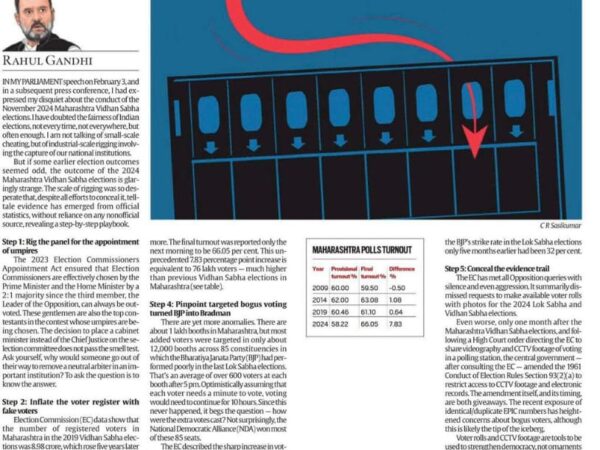
Urban Company has been releasing a series of advertisements under the theme “Dignity of Labour”. These films (three to date: Chhota Kaam, Chhoti Soch, and Chhoti Baat, and now a fourth: Chhoti si Doori), which made my eyes well up, given how I, an Air Force brat, have been an eternal immigrant wherever I go, feature working-class professionals across age, gender, and industry. From the plumber and the beautician to the appliance repair technician, each ad tries to disrupt the entrenched idea that some forms of work deserve less respect than others. They are sensitively written, visually understated, and emotionally persuasive. This is advertising done with care. With intentionality. With conscience.
And, predictably, the criticism has followed. Some of it is fair. Much of it is necessary. The chief charge, of course, is hypocrisy. That Urban Company exploits its own gig workers, enforcing strict performance targets, penalties, and algorithmic discipline, while publicly speaking of dignity and respect. That their workers often cannot afford to take breaks, and are blocked from the platform for missing unrealistic targets. That while the camera speaks of empathy, the backend whispers a different ethic altogether.
And none of that is untrue.
But that is only part of the story. And it is neither a new story, nor one unique to Urban Company. This is the inescapable architecture of the global gig economy. In India especially, regulation is so lax that unless a company bends towards the lowest permissible practice, it cannot remain competitive. Any attempt to pay its workers better, to offer benefits or allow breathing room, would require higher rates to be charged to the customer. And what happens then? The customer baulks. The competition swoops in. The company folds. And with it, the very workers we are trying to protect lose the little they had.
This does not absolve the company (for example, their “Insta Maid” service for ₹49 per hour, which, from the concept to the name, is abhorrent and shameful beyond measure). And it certainly does not suggest that good optics can compensate for bad operations. But it does compel us to widen the frame of blame. The state, for its absence. The market, for its cruelty. And yes, the customer (that’s you, just in case you think you have some sort of moral high ground here), for their unthinking appetite for convenience, which is blind to all morality as long as they don’t have to get off their butt while tweeting about how QCommerce is what makes India great.
But hold that thought for now. There is also something more insidious at play. Something that often escapes scrutiny precisely because it hides behind the veil of moral sophistication. It is the luxury of sitting in air-conditioned, air-purified, silent homes & plush offices, in faculty rooms & airport lounges, in editorial newsrooms & social media forums, and declaring, with great precision, how these representations are inadequate. That they are not intersectional enough. Not inclusive enough. Not caste-aware enough. Not perfect enough. But what happens when these companies disappear? When the jobs vanish? When the small crack in the ceiling that a worker had begun to widen becomes sealed again?
Because for many of those working in the gig economy, these are not ideal jobs. But they are real ones. They are hard-earned, hard-lived, and often the only way out of generational poverty. So when you declare from your perch that this platform is exploitative and should not exist, what you are really saying is that you would prefer the worker to return to your mercy. That you, the architect of this very system, would now like to decide what forms of labour are valid, and which ones must be erased in the name of ideological cleanliness.
And it is here that we must talk about purity. Not just as a metaphor, but as a long shadow cast by caste. The same upper-caste instinct that once separated kitchens and wells and clothes in the name of ritual hygiene now separates movements, politics, and speech in the name of ideological hygiene. Those who once measured the purity of water now measure the purity of representation. The vocabulary has changed, but the neurosis remains. What cannot be touched must not be shown. What cannot be controlled must not be allowed. And what cannot be perfected must not be praised.
This culture of purity, of moral sterilisation, is not an act of liberation. It is a performance of caste by other means. It is the refusal to accept that progress is messy, incremental, and occasionally impure. It is the unwillingness to believe that a flawed gesture may still be a gesture of care. That a problematic platform may still be a path to dignity for someone who has no other.
You built the system. You benefit from it. You chose the policies, elected the governments, priced the goods, absorbed the discounts, and turned a blind eye to the labour behind your lifestyle. And now you have the temerity to declare that a job that feeds someone else’s child is not good enough because it offends your theoretical framework. That is not critique. That is conceit.
And here is what is being missed in the noise: there is a worker who has taken this job not because it is perfect, but because it exists. There is a company that, however inconsistently, is commissioning art that asks us to look again. There is a filmmaker who is writing these scripts with care. There is a budget. There is distribution. There is reach. And yes, there is manipulation too. But when has any social messaging been devoid of it?
Another line of criticism, one that deserves engagement but not deference, is that these ads fail to account for caste, or for the intersection of class and gender, or for regional inequities, or for the lived experiences of tribals, disabled persons, or queer service providers. And that, too, is true. But it is also inevitable. No single ad will capture the totality of marginalisation. No brand film, however sincere, can carry the entire burden of social justice on its back.
So, what then? Do we abandon all attempts? Must every representation be flawless, or not be attempted at all? Is the bar so high that only silence passes?
That is not how any meaningful progress is made. Representation, like reform, must begin somewhere. Clumsily at first, and then with more skill. We can, and should, hold these efforts accountable. But there is a difference between holding to account and holding in contempt.
There is something especially frustrating about the way we tear into imperfect gestures of care, as if the only acceptable moral position is purity and the only acceptable language is perfection. It creates a climate where brands are disincentivised to even try. Where saying nothing feels safer than saying something that might be critiqued. And that helps no one.
So yes, let us question the gap between message and method. Let us demand better laws, more worker protections, and higher ethical standards from the platforms that employ them. But while we do that, let us not sneer at those who are at least trying to change the discourse. And when a communicator, or a marketer, or a director speaks only of the ad itself (like Karthik Srinivasan here), let us not require them to append a full policy statement to their appreciation.
Maybe, just maybe, we can cut them some slack. Cut the company some slack. Cut ourselves some slack.
Because dignity, like representation, is not a destination. It is a direction.
And someone must take the first step.
Disclaimer: For those with comprehension difficulties, let me repeat: THIS IS NOT ABOUT URBAN COMPANY or their practices, their IPO, their rather obvious PR whitewashing, their actual and documented treatment of their workers, their services, their price list, or anything else you might be personally offended by. This is about the turning up of our collective privileged noses at anything that is less than perfect, less than complete, less than “pure” when it comes to inclusivity and representation of marginalised people, and our insistence that our views reflect their perspectives and lived reality. If you cannot understand that, I have nothing more to say to you.
















